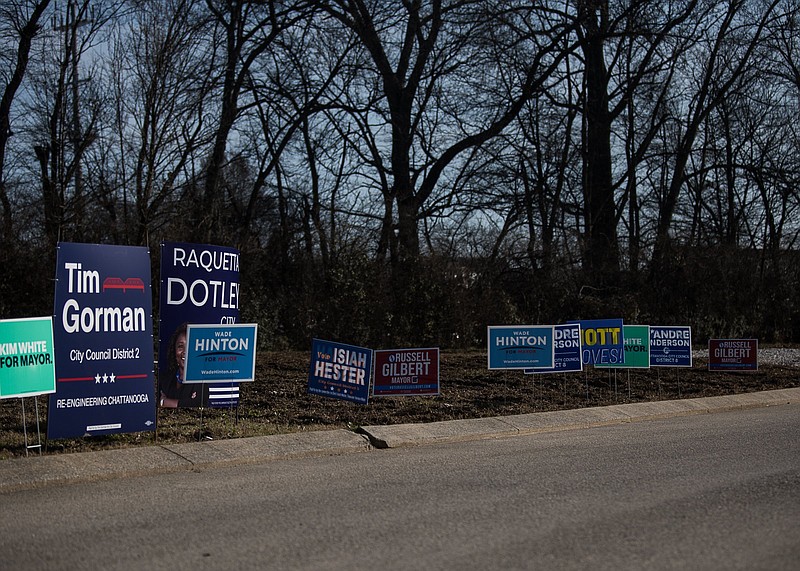There's great truth in the saying that "all politics are local."
That why we cannot stress enough the importance of Chattanooga's March 2 mayoral and city council elections.
Some may ask, "Why is it so important? It's not like it's the president or anything - ."
Exactly, and that's why it is so important.
The president doesn't get your street fixed or set your city sales tax rate or hire your police chief. Those are decisions made by your city mayor and council. (And/or by your county mayor and county commission.)
The president and Congress have essentially nothing to do with your child's preschool or daycare. But in Chattanooga, Mayor Andy Berke-instituted programs like Baby University and an early childhood development program do. Some contenders in the 2021 city mayoral race have said they support continuing those programs at least in some form. Some may not even know what those programs do, and some have other priorities.
Yet because Chattanooga's city elections are held separately from other election cycles, these important issues - and those important candidates who determine street repairs, vote on the city budget and decide on whether the police department has a review board or not - among myriad other things - are elected every four years by a handful of voter-eligible Chattanooga residents. In fact, in recent years they have been elected by just one in six registered city voters.
That's a pathetic representation of representation.
Our city of an estimated 147,153 voting age residents has 114,217 registered voters - 77.6% of our population over the age of 18.
But in the past two city elections of 2013 and 2017, fewer than 20% of those registered voters took advantage of the important opportunity to vote for our city mayor and council members.
In large measure, we can blame it on timing. We've just gotten through with our national and state elections and we're over politics, right? That said, it's time to change the equation.
As we know, we can rise to the challenge of voting: This past year, our nation, Tennessee and Hamilton County all saw a strong surge in voter turnout during the November presidential, senatorial, congressional and other local elections. More than 68% of voters in Tennessee and almost 73% in Hamilton County were motivated to vote despite the COVID-19 pandemic, long lines and other hurdles.
But in election cycle after election cycle, we see voter turnout plunge four months later for the Chattanooga elections that are held in early March.
In 2013, voter turnout for the Chattanooga city elections was beyond anemic - just 16 percent, according to Hamilton County Election Commission records. Of the then-111,324 registered voters in the city, only 18,194 ballots were cast.
Four years later, in 2017, turnout ticked up to 19.7 percent, but that was a little misleading since the number registered city voters had actually dropped to 96,333, according to Chattanooga Times Free Press archives. Still, in that election 1 8,971 city voters came to the polls - just 780 more than four years before. Hamilton County election officials said the number of registered voters had dropped after they performed state required "list maintenance."
This year looks to be more of the same. As of Wednesday evening, halfway through the designated 14-day early voting period, 4,899 Chattanoogans had cast an early or absentee vote for the March 2 city mayoral and council elections.
In essence, city elections held in an off cycle means your street's repairs and your other local concerns are again likely to ride on a very thin margin of voters and their interests.
In 2017, the chairmen of both the Republican and Democratic parties cited voter fatigue for the drop, but be assured: Politics also plays a role.
That year, council members toyed with the idea of change, something that would require a referendum for a city charter amendment and potentially cut short their terms. The idea died.
In 2018, Sen. Todd Gardenhire of Chattanooga made another effort at the state level to move the dates of municipal elections in Hamilton County and Tennessee's three other largest counties. He wanted to move city elections to the August primary and November general election ballots, citing an election cost savings and a real need for better voter turnout.
That effort, too, stalled when fellow lawmakers from both parties weighed in with partisan concerns: It might make it harder for a Republican to win in the cities, which generally vote Democratic. Or it might be harder for a Democrat to win in very red counties in a very red state.
How about: It might make it easier for voters to be motivated to vote for local leadership - just as they do for county elections which already are held in August and November?
But politics are politics, so the city elections - once again - are scheduled for March.
That means it's up to all city voters - all 114,217 who are registered - to ensure that this year is more representative than most.
Just do it.
